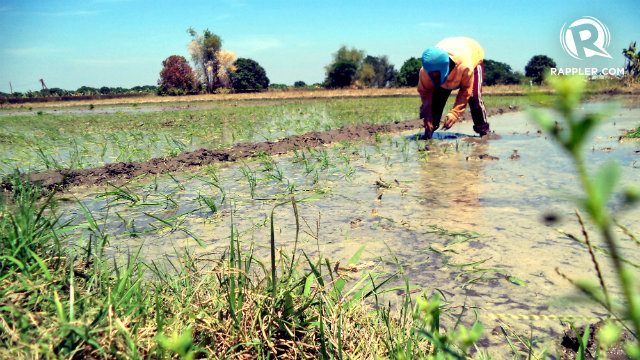SUMMARY
This is AI generated summarization, which may have errors. For context, always refer to the full article.

MANILA, Philippines – As the effects of climate change continue to threaten food security and worsen poverty, farmers are starting to feel the pinch.
In Eastern Visayas, 4 young farmers are hoping to change that.
For Rona Aguillo, 25; Alex Ogsimer, 29; Anthony Tobes, 22; and Conrad Espedilla, 27, moving towards more resilient agriculture will address food security while also providing better income for small-scale farmers, especially as storms and droughts make it harder for them to produce.
Themselves survivors of Super Typhoon Yolanda (international name Haiyan), they know all too well how a storm of that scale could ruin the lives of so many for long stretches of time.
Together with Plan International, they are calling for better irrigation during the recently held Asian Irrigation Forum.
“Irrigation system is really important for farmers. In our community, water supply is not equally distributed due to the absence of irrigation system, giving farmers like us a very low yield,” said Espedilla.
Poverty despite recovery
Two months after Yolanda, the Department of Agriculture reported a total of P17.9 billion in coconut crops lost and P3.2 billion in rice. (READ: How climate change threatens our food security)
After a storm, inundated fields have also reduced crop production, as was the case for Estrella Deliktor, a farmer in Western Samar. Whereas she could harvest around 50 sacks of rice before Yolanda, Glenda (Rammasun), and Ruby (Hagupit) hit Samar island, she found she could only get 30 to 40 sacks after. (READ: After Yolanda, Glenda, Ruby, Samar farmers face hunger, poverty)
Aside from storms, another climate change threat is the increasingly erratic weather. Warmer weather means more difficult irrigation, resulting in farmers spending more and earning less.
For concerned groups, this poses a threat to small-scale farmers who face harsher conditions under the new climate norm. Solving these new issues means working with those on the ground to secure their capabilities.
“We would like to ensure that small-scale farmers receive sustainable, fair, reliable and equitable benefits,” said Plan International Country Director Dennis O’Brien.
“In places where we work in especially those affected by Typhoon Haiyan, young people and marginalized groups are given the opportunity to increase their skills to ensure sustainable food production and security.” – Rappler.com
Add a comment
How does this make you feel?
There are no comments yet. Add your comment to start the conversation.